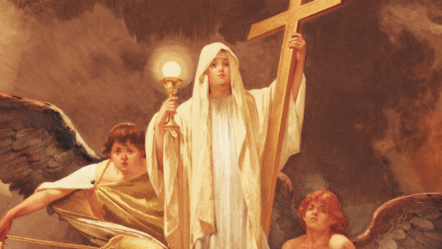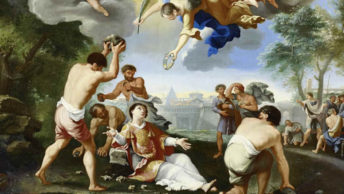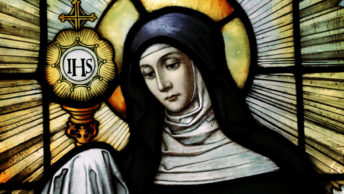“Patience is a virtue.”
I heard this admonition many times growing up, probably because I have never been a very patient person. It turns out that patience is a virtue! It is a component of fortitude and is defined as “the ability to suffer evils well or equanimity in the face of evils.” (Ripperger, 2016)
My adolescent brain assumed that virtues were such because they were what we were to be working on. I knew that I was supposed to be increasing in virtue, though too often these were called “values” even back in the 1980s.
So imagine my surprise upon becoming Catholic to discover that faith, hope, and charity are virtues. I was puzzled by this initially, so I looked up the most common place I had heard about the theological virtues:
We see now through a glass in a dark manner; but then face to face. Now I know in part; but then I shall know even as I am known. And now there remain faith, hope, and charity, these three: but the greatest of these is charity. (1 Corinthians 13:12-13)
This reading, while amazing in so many ways, did not initially explain to me in what way these were virtues. It was clear how justice, fortitude, temperance, and prudence were internal mechanisms with which I could wrestle and increase in my ability to practice them. But love? Love, I was told in fiction and song, was most certainly a feeling. Faith? Wasn’t that a gift from God that He determined how much I got? And hope? I wasn’t even sure what that was, but I thought it was essentially just excited anticipation and happiness. Even though I have always had activities that made me excited in their anticipation and happy – playing music, reading, writing, and intellectual discussion, among others – those things didn’t always make me happy. Sometimes they were frustrating or boring.
It does not take much scratching of the surface of any saint’s writings to discover that hope and happiness are not the same thing. Merely to be happy is an emotional state that can go away at the slightest hangnail. I can be delighted by a cream horn or a shell on the beach, but if these are experienced in a merely temporal fashion, the happiness is primarily a dopamine hit, and I’ll require another one sooner than later. Excited anticipation as well is merely a way that we look forward to Christmas presents or a periodical’s next episode. Certainly, a virtue must have more to it than that.
One week at Mass many years ago, as I had been contemplating this difficulty of working on virtues that I had no idea were even virtues, I heard something unforgettable:
Deliver us, Lord, from every evil, and grant us peace in our day. In your mercy keep us free from sin and protect us from all anxiety as we wait in joyful hope for the coming of our Savior, Jesus Christ.
This caught my attention as never before. “We wait in joyful hope” for our Lord. We hope for heaven in a way that overlaps with the anticipation of Christmas presents but is deeper and holier. I knew I needed to understand more fully. We are blessed to live in a Church that shows Her work. We never have to guess. We can find answers. Hope is defined as, “the virtue by which one awaits beatitude and has confidence in God’s aid.” (Ripperger, 2016)
I continued to puzzle about growing in hope, and Chesterton’s position that “gratitude is happiness doubled by wonder,” helped. I definitely could increase in hope if it included gratitude, as I am resplendent with undeserved blessings. I was surprised to discover the deepest meaning of hope at one of the worst moments of my life.
My youngest son’s wife miscarried my first grandchild. I believe babies to be 100% blessings with no downsides. Sure, the lack of sleep and other temporal concerns are real, but they are just part of the adventure of getting to know these amazing little people and getting to be part of who they become. So, our joy at the news of our first grandbaby, and our heartbreak at the baby’s death comingled. As I sat before the Blessed Sacrament crying without restraint, I found that my heart was filled with joy and gratitude. This little person whom I will never hold in this life is the reason I graduated from Mama to Granny. Hope and grief, joy and pain all hold hands inside of us. If we are willing to take up our crosses, He will always be with us and show us that waiting in joyful hope will make everything not only bearable, but beautiful. Saint Augustine said, “In my deepest wound I saw your glory, and it dazzled me.”
As I processed all of this, I remembered reading in The Everlasting Man:
Pessimism is not in being tired of evil but in being tired of good. Despair does not lie in being weary of suffering, but in being weary of joy. It is when for some reason or other good things in a society no longer work that the society begins to decline; when its food does not feed, when its cures do not cure, when its blessings refuse to bless.
What I misunderstood in my youth was that hope is a virtue in part because it is a choice. I can choose to hope in the Lord that my family will become saints, or I can continue to look at my sins and choose despair. I can hope that God has a beautiful plan for the babies who die prior to birth – there are so many of them He must have a beautiful plan for them. After all, He loves babies even more than I do.
Hope is the antidote to despair. So, each time we receive communion, pray in Adoration, or take up our crosses let us wait in joyful hope.
How can I ever face my fellow men?
“Who Am I”, Les Miserables
How can I ever face myself again?
My soul belongs to God, I know.
I made that bargain long ago.
He gave me hope when hope was gone.
He gave me strength to journey on.








